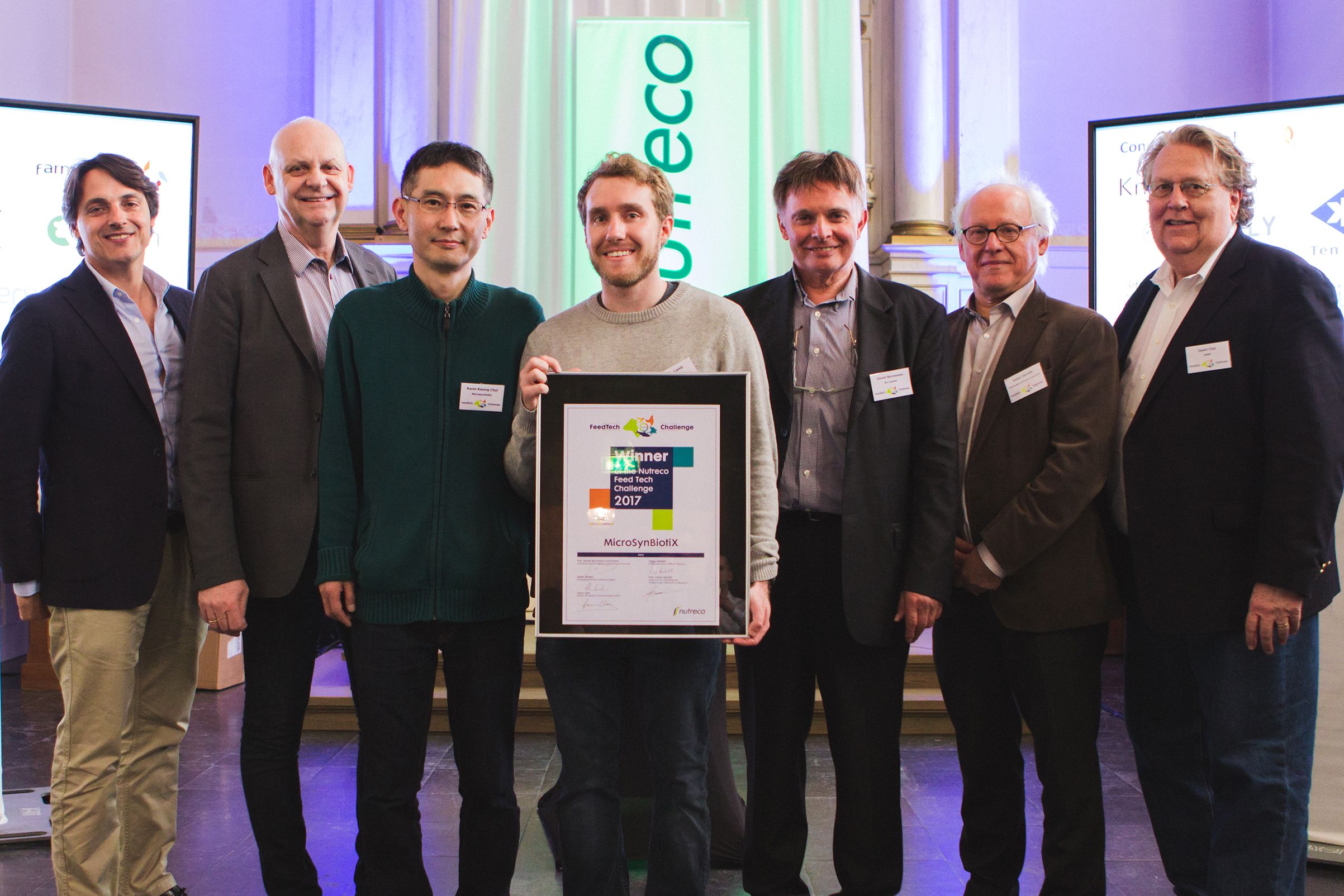MicroSynbiotiX, a startup creating a novel oral delivery process for fish, has won the Nutreco Feed Tech Challenge.
The award is a commitment from the global animal feed company to undertake commercial trials to validate the technology further.
MicroSynbiotiX is using genetically modified microalgae as the vaccine delivery vehicle for farmed fish. This potentially removes the need for producers to inject fish with vaccines, the most common but labor-intensive method currently .
“We effectively lock the vaccine inside the algae, which is then freeze-dried to enable it to be fed to the fish,” said Antonio Lamb, MicroSynbiotiX’s co-founder, along with Simon Porphy. “From then on, the natural digestion process of the fish unlocks the vaccine, making its qualities available to the species.”
Making the Nutreco Feed Tech Challenge top 10
MicroSynbiotiX topped an original list of 44 contenders for the Feed Tech award, and was one of 10 finalists. The company spent two days this week at Nutreco’s research location in Boxmeer in the Netherlands pitching and explaining their product.
They can now look forward to their process being exposed to the full power of Nutreco’s exhaustive product testing regime.
“We’re delighted to win, of course,” said Lamb, who led the company’s presentation with chief scientific officer, Kwang-ChulKwon, “especially as the trials commitment from Nutreco is a reward which would be too costly for us to buy at this stage in our development, even if such a paid-for offer was available, which of course it isn’t.”
Joint runners-up were US-based KnipBio and EKO GEA from Slovenia.
KnipBio’s proposal featured the development of a series of microbes that they say will “convert low-cost feedstock into premium, nutritious, single-cell proteins laden with pigment-enhancing carotenoids to produce healthier, more vibrant fish”.
EKO GEA’s submission centered on Biocomplex, a prebiotic biostimulant which is derived from the seaweed, Ascophyllum nodosum. The product’s inventor, Goran Ðorđič, says the seaweed is capable of enhancing human and animal health, promoting crop and plant growth, while also helping to clean the environment.
Beating the odds
Making the top 10 was impressive as Nutreco’s innovation specialists screened out 70%-90% of entrants within little more than half a day of serious examination.
This is the harsh reality of pitching to a major company, especially for startups convinced they’ve created a product, process or service which is capable of solving the world’s future food security.
Professor Leo den Hartog, R&D director for Nutreco’s animal nutrition division, Trouw Nutrition, told the innovators that the path to commercial success for the next ‘sparkling new idea’ is always going to be pretty tough.
Although he also made it clear that his innovation team was constantly watching and listening for a breakthrough idea, adding that Nutreco gives every such idea a genuine chance.
So, how do you make it into the top 10%-30% that secure more in-depth consideration or even the 1%-2% that make it into the marketplace?
Where Nutreco finds new innovation
“It is not that we lack new ideas,” he told AgFunderNews. “We get a lot of ideas from our own people, both in Boxmeer and in our research centers around the world, and also from other companies; established businesses and start-ups.
“We also have a very close network of universities in many countries with whom we work, looking at their research results and ideas for the future.
“The beauty of the current Nutreco Feed Tech Challenge is that it builds a bridge between these two worlds. On the one hand, there is the world of a large corporation like Nutreco, with our global network and market knowledge. However, by nature, we have limited possibilities to develop disruptive innovations on our own.
“On the other hand, there is the world of young, creative thinkers that have a completely new look on the challenges of today. Linking these two is a very promising recipe for success.”
Developmental challenges
While adding that working through ideas from such a long list of potential sources isn’t easy, Prof. den Hartog agreed there were issues to be faced whether the new product answer was yes or no.
“If we say yes too quickly, for example, we risk spending a lot of testing and development money over, say two years, and then decide it’s not for us,” he said.
“On the other hand, if we say no, or don’t do anything at all, we risk missing developments which are out there that would really be good to have as part of our business.”
Nutreco’s solution has been to build a multi-functional business team consisting of people from its R&D fish and R&D animal nutrition departments, working alongside the company’s specialists in product procurement, marketing, and IP.
“Sometimes, of course, our technical people are really excited by what they see while the marketing guys say it’s ‘nice but too expensive’ and will never compete with an existing product,” he said.
“That is why we are offering an on-farm validation to the Nutreco Feed Tech Challenge winner. The true value of this prize is the chance to test, demonstrate and experience the technology. It is a means to help overcome and solve different problems. Validation offers the winner a true test in a farm environment and it helps speed up development.”
The other seven Nutreco Feed Tech Challenge finalists:
eFishery (Indonesia) has created an integrated feeding solution for fish and shrimp farming, based on an internet-connected machine that the company says “can feed the fish automatically, sense the fish’s appetite and adjust the amount of feed given for that appetite.”
Metabolic Robots (Israel) has developed a system to optimize poultry house feed distribution “enabling real-time monitoring and management to significantly improve broiler house efficiency and profits.”
FarmControl (Portugal) has created a solution that “allows farmers to monitor and control remotely in real-time, any type of equipment on their farm.”
Fodjan (Germany) has built a web platform for feed management for the livestock sector “connecting the different stakeholders in feeding strategies (i.e. farmer, consultant, trader, and veterinarian), plus laboratories and feeding machinery.”
Hexafly (Ireland) has developed a technology to “produce Hermetia illucens (black soldier fly) while limiting waste to zero and developing high-value coproducts for the plant nutrition and biopolymer industry.”
LifeBioencapsulation (Spain) has developed “solutions to microencapsulate functional molecules and microorganisms in order to increase their efficacy in case of oral administration.”
Ten Kate (The Netherlands) has created “protein modifications with antimicrobial and growth enhancing properties, resulting in a healthier (young) livestock population with better growth perspectives and reduced use of antibiotics.”
Image: Nutreco Feed Tech Challenge jury members with the winning team. (Left to Right) Adam Anders, managing partner at Anterra Capital; Viggo Halseth, Chief Innovation Officer at Nutreco; Kwang-Chul Kwon, MicroSynbiotiX; Antonio Lamb, MicroSynbiotiX; Prof. Daniel Berckmans of KU Leuven; Prof. Johan Verreth, Wageningen University & Research, and Dr. Jason Clay, senior vice president market transformation at WWF.





